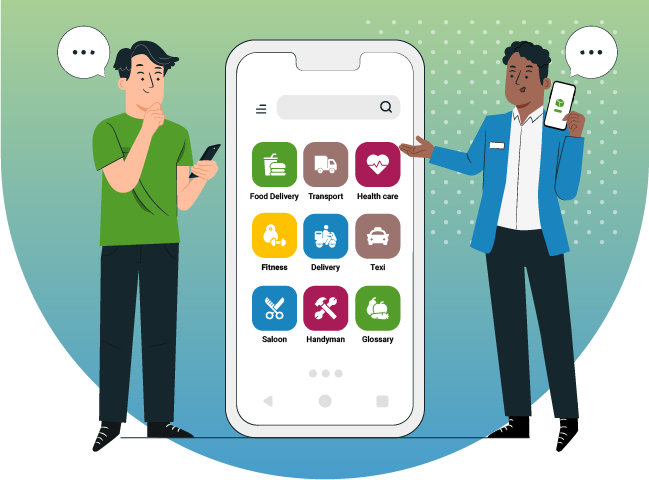


As an experienced on demand app development company, we transform your business with our robust on demand apps. We assist you in reaching an optimal target audience, gaining increased profitability. Our on demand app developers are well competent to implement a wide range of tailor-made application development services catering to a multitude of industry segments around the world.
SPEC INDIA is a modern on-demand app development company that leverages the power of on demand app development with cutting-edge technologies and high-end proficiency with a skilled team of app developers.

As an experienced on demand mobile app development company, we create full-fledged on-demand food delivery applications that assist you in getting your favorite cuisine at your doorstep. We ensure a flexible and convenient food delivery experience with enriched features and cutting-edge technologies. It becomes simpler to build a higher brand image for the business, attracting newer customers with robust features and service offerings.

Our effective on demand app development focusses on the healthcare industry segment to offer on demand healthcare applications. These apps offer smooth integration and services to the patients and other stakeholders, leading to efficient doctor consultation, patient management, appointment booking, insurance management, medical history etc. The telemedicine apps help patients to connect with doctors more frequently and access better healthcare virtually without geographical boundaries.

We create on demand apps for your logistics, trucking, fleet management and courier business offering real-time information about major activities involved in the manufacturing and shipping industry. You can go in for different transport and logistics apps based on your business objectives and requirements. This could include warehouse mobile apps, fleet management apps, tracking and forwarding applications and logistics on-demand.

We, as an on demand app development company, offer on-demand home services applications for easy and fast access to services at home. It could include home cleaning and repair of different gadgets being used, packers and movers, shifting of furniture, modular kitchen and home design, party events, make up services, photography shoots, tuition classes for subjects, music, drawing etc.

Online and instant delivery of grocery items and goods is the most happening thing today and its demand is ever rising. We understand the significance of on-demand apps, analyze the futuristic needs, and offer optimal services in meeting the demand of varied industry segments with cutting-edge features like doorstep timely delivery, ease of access etc. We ensure maximized profits, increased revenue, profitability, and productivity.

Our custom on-demand travel apps offer tour, travel, tourism app development by facilitating online booking of flights, hotels, vacation plans, booking history, multiple payments, reward points etc. Our skilled professionals create travel apps to enhance your revenue multi-fold. Implementation of these apps help in augmenting travel business with a wider reach across the globe, simplified traveling and accessing travel-related services.

You can seamlessly take online bookings, manage appointments with different beauty salons across your premises. Our on-demand beauty apps offer a variety of salon and beauty app development services that suit your needs and are tailored to fit your requirements. It includes implementing apps in the beauty marketplace, salon booking app development, loyalty programs, in app payment, real-time GPS etc.

Taxi applications are one of the most popular on demand apps that are popular all over. We understand the nuances of the taxi and transportation industry, making the most of the on-demand concept for creating interactive and user friendly interfaces that can help tracking and booking taxis, offering support, booking appointments, managing schedules, locating stores, setting alerts etc.

As a leading fitness app development company, we indulge in innovative on-demand fitness app development for comprehensive health and wellness, meant for health enthusiasts. Our proficient solution experts possess domain-specific knowledge in the areas of digital fitness, that caters to the intricacies of the industry. We @ SPEC INDIA build a fitness app that is flexible, versatile, exemplary, and meant for your personal fitness needs.

You can build on-demand, robust entertainment applications through our taskforce. You can even launch your own entertainment service that is online and offers you top quality talent and post-deployment support. There are salient features such as online streaming, in-app sharing, managing videos, downloads, video streaming, profile management, live chatting, social media support, language based listing, supported filters etc.

As an on demand mobile app development company, we thrive to provide exceptional technology-driven solutions that can help you stay one step ahead of the rest.
Swift
Objective C
Xcode
UIKit
Java
Kotlin
Android Studio
Android SDK
Kotlin Coroutines
Flutter
React Native
Ionic
NativeScript
Firebase
React
Angular
Redux
Our customized and effective on demand apps are meant to satisfy your own needs and showcase the below mentioned features, be it any type of domain that you are looking into.
Our on-demand apps are well competent to offer real-time insightful information that can help in enhancing business revenue. You can judge client behavior, preferences, disliked, experience and thereby, take decisions accordingly. This helps you to understand prospects, increase efforts to retain customers and gain better visitor traction.
One of the major features of an effective on demand app is the fast and instant service booking that can be done. It is a salient advantage to the end user and the application owner. It is a great way to grow, build and prosper your business by offering prompt service facilities in a digital manner.
In application chatting feature is yet another feather in the cap while pursuing on demand app development. It is always advantageous to be responsive to the queries raised by clients by offering an in-app chat facility that is prompt, trustworthy and effective. It enhances the collaboration between the clients and service providers.
There is so much to offer on the on-demand apps. Customers are in search of certain specific facilities at a certain time. That is where a good search and filter facility can be of great value and fast enough to fetch the needed details at the tip of a finger.
In the world influenced by ratings and reviews, customers rely on reviews given by other customers and the service providers are also equally affected by reviews and ratings given by customers. This feature is a much needed one for pushing sales, increasing business and credibility to increase revenue and take actions correspondingly.
Building a good brand image and taking the online presence further high is a necessity for any business and hence a required feature for any on demand app. The futuristic view of the application must be robust enough to increase the brand visibility of the application in the digital world.
Hiring an on demand app developer from SPEC INDIA is a profitable and simple process. As a popular on demand app development company, our process enables flexible engagement of technical experts who have had extensive implementation experience of complex on demand projects. Our developers need minimal training, offer round-the-clock support and work as efficient IT partners.
Talk To Us
Discover the diverse range of industries we proudly support with our innovative software solutions to companies of different business verticals. Our expertise spans multiple sectors, ensuring tailored services for every unique need.
On demand apps are web or mobile solutions that empower users to instantly receive or plan services, or buy products, belonging to different genres, from specified organizations. There could be multiple on-demand organizations for comparison in the application.
Development of on demand apps relies on different factors such as project complexity, organizational objectives and needs, availability of skilled resources, budget estimates etc. It would be better to discuss this with our experts to understand in detail.
Our various project execution models ensure timely deliverables and quality software solutions. We follow DevOps, Agile, Waterfall, and Iterative models based on the project requirement, scope, and functionalities. Our detailed execution strategy and selection of the right execution model help us deliver better, faster, and desired outcomes.
Any good on-demand app is leveraged to decrease the gap between the client and service provider, be it any type of app. Customers can either place their order or book an appointment or purchase any stuff ad instantly avail services in terms of delivery of goods or appointment schedules. It may vary based on the type of on-demand service requested for.
Yes, very much. Being a proficient on-demand app development company, once it is thoroughly developed and tested, it will be uploaded to the respective play store – Google Play Store or Apple App Store, with complete guidelines as to how to use it and download it.
With technology penetrating all industry segments, the future of on-demand apps is bright. Almost all industry segments have adopted the very concept of on-demand applications and newer ways of implementing it are coming up. The time to come shall see innovative technologies like AI, ML, AR, VR, Blockchain, etc. integrating with on-demand apps.
SPEC House, Parth Complex, Near Swastik Cross Roads, Navarangpura, Ahmedabad 380009, INDIA.

This website uses cookies to ensure you get the best experience on our website. Read Spec India’s Privacy Policy